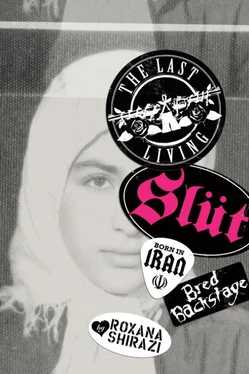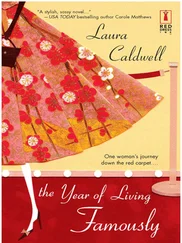The air outside was arid, and smelled of trees and dry clay. In the summer at about five p.m., after their afternoon siestas, the adults would soak the scorched ground of their doorstep with splashes of cold water, and the air would dampen with the smell of just-rained-on ground.
The house had a vast roof. On blazing hot summer nights, like everyone else in the neighborhood, my grandmother, my mother, and I would put our bedding outside and sleep under the stars that crammed the raw Persian sky. We slept in a pasheh–band , a white gauze tent that kept the insects away. It was held up by nails in the squat wall surrounding the rooftop. In the night, I’d see chimneys like gap teeth in the blackness, and hear the low hum of the neighbors’ murmurs and velvety laughter coming from their rooftops.
In our home, there were four small spaces on the ground floor sectioned off as rooms by a wall in the middle. Just past the front door was a small foyer with nothing except a gold-leafed mirror, a telephone, and a storage cupboard for stacking bedding sheets and duvets—this was our reception area. Just past it was a room with biscuit-fragile windows and a glass door that led into the garden, the window frames all painted in the same chipped lemon–yellow paint. This room was where my mother and I—and sometimes my aunt and cousin—slept on yards and rolls of cotton sheets and puffy rose pillows that my grandmother had kept immaculate for years. On the other side of the wall was a living room with an old clunky black heater that let out foul fumes. The room had sliding doors to create a space for my great-grandmother to sleep at night. With her raven-black braids hanging to her knees, she’d sit in a dark corner of that space, vacant with Alzheimer’s, dressed always in a long white gown, a lone figure staring ahead.
Every inch of the downstairs floor was covered in layers of thick Persian carpets, which crashed into one another like watercolor waves. Intricate squiggles, flowers, and curves exploded in a frenzied dance on electric turquoise, deep browns, and shameless reds, hypnotizing me. I’d sit there trying to make sense of their designs but eventually give in, preferring to join them, lie on them, kiss them.
The second floor was unoccupied. It had two rooms, one with its own balcony overlooking the garden, an ancient kitchen, and a decaying bathroom. Gray stone steps led to the ground floor, which was where we lived. The front door was short but thick. It was never locked. Instead, it stayed open to let in the constant stream of relatives and neighbors who ate, slept, gossiped, loved, cried, and laughed with us. Immediately to the left of the main door was a tiny bathroom with a porcelain squat toilet and a shower.
Next to that was the crumbling kitchen where my grandmother sat amid a palace of pots and pans, creating the most intoxicating carnival of dishes: ash-e reshteh, ghormeh sabzi, zereshk polo, sholeh zard , and my favorite, koofteh tabrizi , from the northern city of Tabriz where my mother’s family was from. The dish is a heap of minced meat mixed with crushed walnuts, tarragon, and zereshk (tiny dried sour berries) and rolled into a massive, round meatball with a boiled egg planted in its delicious heart after it’s cooked.
The kitchen where my grandmother cooked had a dungeon-like cellar. It was a place of dread, accessible only through an iron hatch hidden under a rug. One day curiosity got the better of me and I slipped my fingers through the bars of the hatch and lifted it. I peered into a bottomless black hole. Climbing down the greasy cloth-bound ladder, I could feel the presence of monsters waiting for me. The cold air gripped my head and seeped into my widened eye sockets as I struggled to see in the pitch-black. My feet touched the ground and I stood there, shivering with cold and fear, terror and repulsion swimming through my wrists and throat as I awaited some unspeakable horror.
I knew there must be rats and cockroaches crawling everywhere, but I just stood there like a scarecrow in my thin cotton dress, letting the thrill of fear give me a fantastic rush in my tummy. I didn’t dare walk around in case I bumped into something—maybe even my dead grandfather. (An uncle had once told me that his body lay down there among the musty papers from the past.) After a minute or two, when I couldn’t stand it any longer, I climbed back up the ladder, to the light and warmth. My soul and heart embraced and fed on the thrill I’d experienced. So whenever I felt the yearning, on silent afternoons, I would tiptoe once again to the kitchen, lift the heavy, cold, iron hatch, and climb down so I could see beyond my world. Sometimes I even felt a sense of holiness elevate me in those confines. My grandmother would always call after me, but in my mind I was far away, ready to be transported to the dark side.
I Found Shelter in Her Lap and Heaven in Her Protection.
My grandmother was goddess-like in her aura. Her motherly instinct extended to everyone she encountered. Her nickname, Anneh, means mother in northern Persian dialect. Her lungs racked by years of asthma and her heart swollen by unconditional love, she constantly gave her energy and time to the people in her life. She always worked hard to ensure that the banquet of dishes she carefully prepared delighted everyone. Sunny by nature, she relished life, always dancing and laughing. The sheer pleasure she took from the smallest things—like selecting shades and textures of cloth for dress-making—gave her pure joy.
“My home is everybody’s home,” she’d say, glowing with pride while dishing out dinners to random relatives and neighbors who dropped by. Sadly, though, as her eyesight faded, she sometimes made little mistakes in the kitchen—like adding sugar to the stew when she meant to use salt. And the antiquated horsepills her doctor prescribed for her asthma thinned her skin. Over time, we would see her veins, bulging and blue, swimming beneath the translucent white skin of her frail hands, decorated by a treasured ruby ring her children had given her on Mother’s Day. “One day it’s going to be yours, my princess,” she’d say whenever I tried to play with it.
Still, she remained beautiful, with chestnut brown hair fashioned in a bob and honey eyes glistening with natural seductiveness, just like my mother’s. “ Ashraf khanoom , you’re always dressed so chic,” I’d hear women tell her at mehmoonis (family parties). “Is it from Paris?” They’d sniff around her bags and dresses, and she’d always end up giving away one thing or another.
Even though this was the peak of the Shah’s rule, a time when Westernization was being heavily promoted, she still covered her body with a long, flowery chador —the Islamic head-and-body covering—when she went out of the house. She didn’t do it for religious purposes but strictly because she liked tradition.

People gathered at our house at night, and Anneh always started the dancing, getting everyone on their feet to move to the Iranian pop songs blasting from the cassette player. She was happy, always singing, always full of light. She welcomed everyone into our home with such genuine love and warmth that I wondered if anything ever really upset her. I found shelter in her lap and heaven in her protection when I put my head against her fat tummy, hearing the clutter of her insides and sniffing the faint smell of her Western perfume, while my mother went to work every day teaching teenagers at the local school.
My mother had a psychology degree and taught literature, psychology, and Arabic, leaving early in the morning and coming back at dusk. She had gone back to work four weeks after giving birth so she could provide for me and my grandmother. Sometimes her breast milk seeped through her shirt mid-lecture.
Читать дальше













